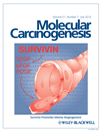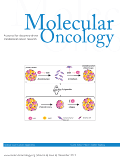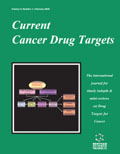
MOLECULAR CARCINOGENESIS
Scope & Guideline
Exploring the Frontiers of Cancer Research
Introduction
Aims and Scopes
- Molecular Mechanisms of Carcinogenesis:
The journal primarily investigates the molecular and cellular mechanisms that lead to cancer, including genetic mutations, epigenetic modifications, and signaling pathways. - Cancer Biology and Tumor Microenvironment:
Research on how tumors interact with their microenvironment, including the role of stromal cells, immune cells, and extracellular matrix components in tumor progression and metastasis. - Therapeutic Targets and Drug Resistance:
Exploration of novel therapeutic targets, mechanisms of drug resistance, and the development of innovative treatment strategies, particularly in the context of targeted and immunotherapy. - Biomarkers for Cancer Diagnosis and Prognosis:
Studies aimed at identifying and validating biomarkers that can improve cancer diagnosis, prognosis, and treatment response. - Translational Research:
Research that translates laboratory findings into clinical applications, focusing on how molecular insights can inform cancer prevention, diagnosis, and treatment.
Trending and Emerging
- Targeting the Tumor Microenvironment:
A growing body of research is focusing on the tumor microenvironment, including the roles of cancer-associated fibroblasts, immune cells, and extracellular vesicles in tumor progression and therapy response. - Molecular Mechanisms of Drug Resistance:
There is an increasing emphasis on understanding the molecular mechanisms underlying drug resistance, particularly in the context of targeted therapies and immunotherapy. - Epigenetic Modifications in Cancer:
Research into the role of epigenetic changes, such as DNA methylation and histone modifications, in cancer initiation and progression is gaining momentum, reflecting a deeper understanding of gene regulation. - Precision Medicine and Personalized Therapy:
Emerging studies are focusing on precision medicine approaches that tailor treatments based on individual genetic profiles and tumor characteristics, enhancing therapeutic efficacy. - Non-coding RNAs and Their Roles in Cancer:
The role of non-coding RNAs, including long non-coding RNAs and microRNAs, in regulating cancer pathways and their potential as therapeutic targets is increasingly prominent.
Declining or Waning
- Traditional Chemotherapy Studies:
There is a noticeable decrease in publications focusing solely on traditional chemotherapy mechanisms and outcomes, as research increasingly emphasizes targeted therapies and immunotherapies. - Basic Epidemiological Studies:
Though important, basic epidemiological studies are becoming less frequent compared to molecular and mechanistic studies that provide deeper insights into cancer biology. - Single-Agent Drug Studies:
Research focusing on the efficacy of single-agent chemotherapeutics is waning, with a shift towards combination therapies and multi-target approaches that may offer better outcomes. - In Vivo Animal Models:
While still relevant, there is a reduced emphasis on traditional in vivo animal models in favor of more sophisticated models that better mimic human disease, including organoids and patient-derived xenografts. - General Cancer Prevention Strategies:
Research that broadly addresses cancer prevention without a molecular basis is declining, as more studies focus on specific molecular pathways and targeted prevention strategies.
Similar Journals

Molecular Cancer
Championing high-quality research for impactful outcomes.Molecular Cancer, published by BMC, stands as a premier open access journal dedicated to advancing our understanding of cancer biology, treatment, and prevention since its inception in 2002. With an impressive Q1 ranking in the domains of Cancer Research, Molecular Medicine, and Oncology, this journal occupies a significant position in the academic landscape, emphasizing high-quality research that influences clinical practices and future studies. The journal is indexed in leading databases with exceptional Scopus ranks, reflecting its rigorous peer-review process and impactful contributions to the field, where it ranks in the top 2-3 positions across various relevant categories. Based in the United Kingdom, Molecular Cancer offers researchers worldwide a valuable platform for disseminating innovative findings that drive the biomedical community forward. The journal's open access model ensures that groundbreaking research is freely accessible, fostering collaboration and knowledge sharing among professionals, students, and academics alike. Explore cutting-edge developments in cancer research through Molecular Cancer and join a community committed to improving patient outcomes and advancing scientific discovery.

JOURNAL OF EXPERIMENTAL & CLINICAL CANCER RESEARCH
Bridging experimental insights with clinical breakthroughs.The JOURNAL OF EXPERIMENTAL & CLINICAL CANCER RESEARCH, published by BMC, is a leading open-access journal dedicated to advancing the field of cancer research and oncology. Since its inception in 1982, this esteemed journal has fostered innovation and collaboration in the scientific community, as evidenced by its outstanding impact factor and position in the Q1 quartile for both Cancer Research and Oncology categories in 2023. With a proud commitment to disseminating high-quality research, the journal operates under an open-access model, ensuring that findings are readily accessible to researchers, healthcare professionals, and students worldwide. The journal has established a distinguished reputation, ranking 23rd out of 404 in Medicine oncology and 16th out of 230 in Biochemistry, Genetics, and Molecular Biology (cancer research), showcasing its importance and influence in guiding the future of cancer treatment and research. With the aim of bridging experimental and clinical research, this journal invites submissions that push the boundaries of our understanding of cancer biology and therapy.

EXPERT REVIEWS IN MOLECULAR MEDICINE
Transforming Research into Critical InsightsEXPERT REVIEWS IN MOLECULAR MEDICINE, published by Cambridge University Press, stands at the forefront of research in the fields of Molecular Biology and Molecular Medicine. With an impressive impact factor reflecting its Q1 status in both relevant categories, this journal serves as an essential platform for disseminating cutting-edge reviews and critical assessments that are vital for advancing our understanding of molecular mechanisms in health and disease. Established in 1997 and continuously evolving until 2024, it features contributions from leading experts that highlight emerging trends and innovative methodologies. Researchers, professionals, and students are encouraged to engage with the content, benefiting from the journal’s rigorous peer-review process and its commitment to academic excellence, making it a valuable resource within the scientific community.

JOURNAL OF GENE MEDICINE
Advancing the Frontiers of Gene TherapyThe Journal of Gene Medicine, published by Wiley, stands as a pivotal resource in the field of gene therapy and molecular medicine, with a rich history of dissemination of impactful research since its inception in 1998. With an ISSN of 1099-498X and an E-ISSN of 1521-2254, this esteemed journal plays a crucial role in advancing our understanding of genetics and drug discovery, reflected in its impressive 2023 Scopus rankings where it holds a Q2 classification in Drug Discovery and Q3 in several genetics-related categories. The journal aims to facilitate the exchange of high-quality research findings that bridge the gap between laboratory and clinical applications, making it an essential platform for researchers, academics, and healthcare professionals committed to the forefront of genetic innovation. Although it does not currently offer open access options, its reputation for rigorous peer review ensures that all published work meets the highest academic standards, providing a reliable reference for scientific inquiry in the United States and beyond. As the field rapidly evolves, the Journal of Gene Medicine remains at the helm, guiding future discoveries with its influential publications and comprehensive insights.

Annual Review of Cancer Biology
Exploring the Complexities of Cancer ScienceAnnual Review of Cancer Biology is a pivotal journal published by Annual Reviews, specializing in the rapidly evolving field of cancer research. With an impact factor positioned in the distinguished Q1 quartile of Cancer Research, Cell Biology, and Oncology categories, this journal ensures that it showcases the highest quality of scholarly contributions. Indexed in Scopus, it ranks among the top in its fields, reflecting its strong influence and relevance, with remarkable percentiles indicating its esteemed position within the research community. Although not an open-access journal, it provides a comprehensive platform for advancing the frontiers of cancer biology through rigorously curated reviews, highlighting key developments, breakthroughs, and future directions that inform both academia and clinical applications. As a valuable resource for researchers, professionals, and students, the Annual Review of Cancer Biology serves as an essential guide for understanding and addressing the complexities of cancer biology today.

Molecular Oncology
Connecting the Dots in Cancer Biology and Treatment.Molecular Oncology, published by WILEY, is a premier open-access journal that has been at the forefront of cancer research since its inception in 2007. With an impressive impact factor reflective of its outstanding contribution to the field, it holds a prestigious position in the Q1 category across multiple disciplines, including Cancer Research, Genetics, and Molecular Medicine. This journal is essential for researchers and professionals seeking to publish high-quality findings in a rapidly evolving area of study, underscored by its significant Scopus rankings that place it within the top percentiles of Oncology and Molecular Biology. As an open-access journal since 2017, it ensures that vital research is readily available to a global audience, thereby facilitating collaboration and knowledge dissemination among academic and clinical communities. With its commitment to innovative and impactful research, Molecular Oncology continues to be a critical resource for advancing our understanding of cancer biology and treatment.

CURRENT CANCER DRUG TARGETS
Connecting knowledge and innovation in cancer drug development.CURRENT CANCER DRUG TARGETS is a prominent academic journal published by Bentham Science Publishers Ltd, focusing on the critical intersection of cancer research and innovative drug development. Since its inception in 2001, this journal has offered a platform for the dissemination of cutting-edge research aimed at advancing targeted cancer therapies, contributing significantly to the fields of Cancer Research, Drug Discovery, Oncology, and Pharmacology. With a respectable impact factor and consistent ranking in its respective categories, including Q2 in Drug Discovery and Pharmacology, it positions itself as an invaluable resource for researchers, clinicians, and students alike. CURRENT CANCER DRUG TARGETS is dedicated to enhancing our understanding of novel therapeutic targets and methods, thereby fostering a collaborative environment for knowledge exchange in the ever-evolving landscape of cancer treatment.

Cancer Cell International
Transforming Knowledge into Cancer SolutionsCancer Cell International, published by BMC, is a transformative open-access journal established in 2001, dedicated to advancing the field of oncology and cancer research. With its ISSN number not specified and an E-ISSN of 1475-2867, the journal proudly operates from the United Kingdom, located at CAMPUS, 4 Crinan St, London N1 9XW, England. Renowned for its rigorous peer-review process, Cancer Cell International has made significant strides, securing a Q2 ranking in Cancer Research and Q1 rankings in both Genetics and Oncology as of 2023. It ranks impressively in Scopus, featuring in the top quintile of Genetics (#37/347) and Oncology (#52/404), indicating its importance within the scientific community. The journal's broad scope caters to a diverse array of topics within cancer biology, making it an invaluable resource for researchers, professionals, and students seeking to stay at the forefront of cancer science. With a commitment to disseminating high-quality research, Cancer Cell International invites scholars to explore innovative findings and contribute to the collective effort of combating cancer.

MUTATION RESEARCH-FUNDAMENTAL AND MOLECULAR MECHANISMS OF MUTAGENESIS
Bridging Theory and Experiment in Mutation ResearchMUTATION RESEARCH - FUNDAMENTAL AND MOLECULAR MECHANISMS OF MUTAGENESIS is a premier peer-reviewed journal published by Elsevier, dedicated to advancing the understanding of mutagenesis and its broader implications in genetics, health, and molecular biology. With an impressive converged publication history from 1964 to 2024, this journal provides a vital platform for the dissemination of high-quality research findings, contributing significantly to the field's knowledge base. Indexed in Scopus, it holds a Category Quartile ranking of Q3 in Genetics and Q2 in Health, Toxicology, and Mutagenesis, further underscoring its relevance and stature. Access options are available, catering to a diverse audience of researchers, professionals, and students eager to stay informed on the latest developments in mutagenesis research. By bridging experimental studies and theoretical frameworks, the journal plays a crucial role in exploring the fundamental mechanisms underlying genetic mutations and their effects on human health and the environment.

CANCER GENE THERAPY
Transforming Cancer Care Through Genetic InsightsCancer Gene Therapy, published by SpringerNature, stands at the forefront of research in the fields of cancer research, molecular biology, and molecular medicine. With a robust impact factor reflecting its significant influence—ranking in the Q2 category for cancer research and Q1 for both molecular biology and molecular medicine—it serves as an essential resource for scholars and practitioners alike. Since its inception in 1994, the journal has dedicated itself to advancing the understanding and therapeutic application of genetic innovations in oncology. Notably, it holds distinguished Scopus ranks, placing it among the top tier journals in its categories, underscoring its importance to the scientific community. While open access options are not available, the compelling research published here offers invaluable insights into the latest advancements and strategies in cancer therapy. Engaging with *Cancer Gene Therapy* not only keeps professionals informed but also inspires future innovations in the quest for effective cancer treatments.